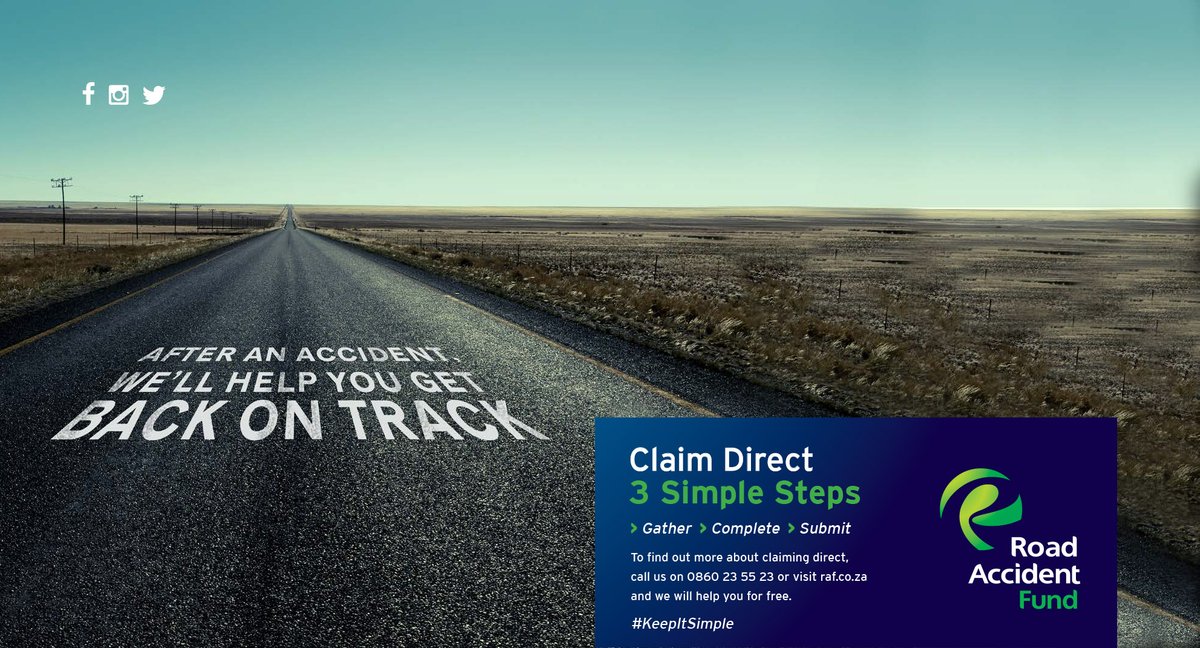Many myths plague the option of claiming directly with the Road Accident Fund (RAF) to the extent that many car crash victims would rather employ a third party. And yet, in truth, claiming directly is much simpler than many of us have been led to believe – 3 simple steps: Gather the required documents, Complete the submission form and Submit the form and documents at your nearest RAF office. The myths that deter people from claiming directly ought to be debunked, and the record set straight:
- The RAF is not easily accessible
A road crash is a traumatic experience and very challenging for families if it results in major injuries or death. Road crash survivors often feel frustrated with the paperwork or process required when dealing with hospitals and other healthcare professionals. A prevailing myth that the RAF is inaccessible adds to this frustration. However, RAF’s wide network of 100 Hospital Service Centers, 5 customer service centres, 5 regional offices, social media platforms, website and Call Centre are actually easy to access for information and assistance when lodging a claim. RAF personnel share the claims steps at these touchpoints and after the initial engagement, people are usually more confident that they opted to claim directly.
- The administrative claims process is too long
The myth that the administrative claims process is a drawn-out affair is untrue. Direct claims tend to be processed more promptly because the process does not involve lengthy litigation and the concomitant period of time required to proceed to trial, which is prevalent in relation to represented claims. Therefore, any arguments put forward on turnaround times being a risk to settlement values appears to fail to take into account the distinction between claiming directly and claiming through a legal representative.
- The RAF is incompetent and legal help is therefore required
The idea that people do not get great service from RAF without a lawyer is not true. For direct claims, the claimant is consulted throughout the process and is constantly aware of the amount that they are claiming for. The RAF has a Direct Claim Management Policy in place that specifically provides for the management of disputes by direct claimants, should a dispute arise. Direct claims improve service delivery by the RAF through direct interaction between the RAF and the claimant, something which is not possible where the claimant is represented by an attorney. The direct claimant therefore has first-hand feedback from the RAF on the status of the claim. Payment of the compensation is also made in full directly to the direct claimant, whereas in the case of an attorney, it is reduced due to contingency fees and expenses. Lastly, the RAF has received a number of accolades in recent years in recognition of its commitment towards service delivery, while four Clean Audits in recent years has been further indication that the RAF’s operations and finances are managed responsibly.
- The jargon used is incomprehensible
Information shared by the RAF through its various platforms is simple to read and easy to digest. The anticipation of jargon is probably because of the perception of insurance processes, but RAF has ensured that information is accessible, with claims consultants on hand to assist when necessary. Any queries or clarification required may be channeled through the RAF Call Centre on 0860 23 55 23, Monday to Friday, between 07h45 to 16h00. Assistance is available in any of the 11 official South African languages.
- RAF bids for the lowest settlement amount
The RAF’s Direct Claim Management Policy and Standard Operating Procedure (the Framework) regulates the internal management of direct claims, and requires that RAF employees ensure that direct claims are neither under-settled, nor over-settled. Where non-instances of compliance with the Framework are identified, they are dealt with and corrective action is taken in terms of the RAF’s Disciplinary Policy, where appropriate. In addition, the Framework provides for regional Quality Assurance teams to vet direct claim offers to ensure that offers prepared by Claims Handlers are complete and reasonable. In addition, internal and contracted actuaries perform regular reviews of direct claim settlements. These reviews are supplemented by quarterly reviews performed by the Statutory Actuary appointed by the RAF, in compliance with the regulatory requirements of the Financial Sector Conduct Authority. On a comparative basis, these reviews confirm consistent settlement values paid to direct claimants as compared to represented claimants.
Conclusion
Since the RAF’s introduction of direct claims initiatives less than a decade ago, direct claims have continued to show a marked increase in their prevalence, growing from 15% of new claims in 2011/12 to 37% in 2017/18. This increase indicates the confidence that direct claimants have in the RAF and its services.
How do I claim from the Road Accident Fund? #ArriveAlive @RAF_SA pic.twitter.com/3ojnsZJZt9
— Arrive Alive (@_ArriveAlive) February 22, 2018
